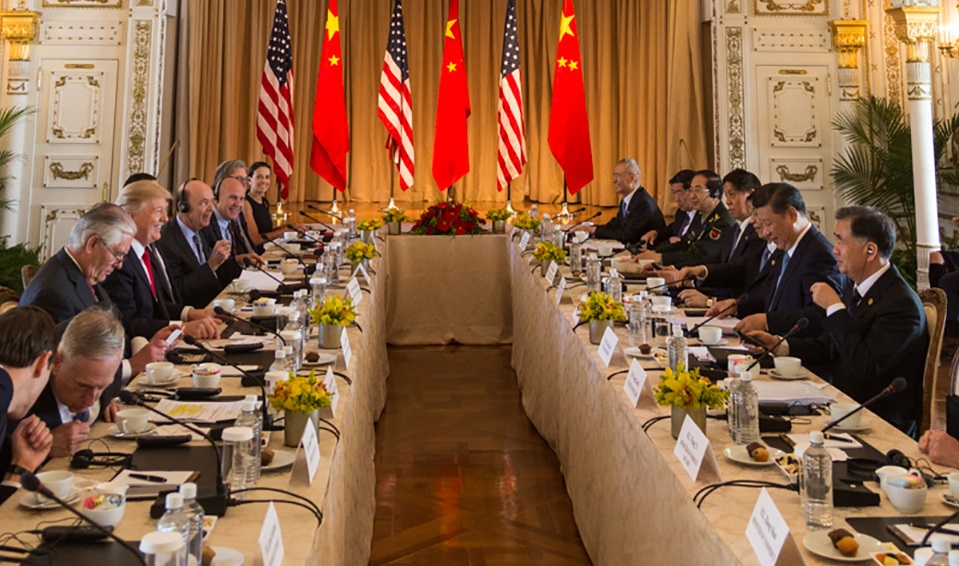
By The ICAS Team

U.S. Pressed to Pursue Deal to Freeze North Korea Missile Tests
David Sanger and Gardiner Harris
The New York Times, June 21
China Pushes Back as U.S. Aluminum Industry Urges Crackdown on Imports
Lesley Wroughton
Reuters, June 22
China is Among Worst Human Trafficking Offenders, State Department Says
Gardiner Harris
The New York Times, June 27
China’s Premier Praises Free Trade, in Contrast to Trump
Keith Bradsher
The New York Times, June 27
Chinese Leader Warns Hong Kong Not to Buck Beijing’s Authority
Scott Neuman
NPR, July 1
China Vows to Step Up Air and Sea Patrols After U.S. Warships Sail Near Disputed Islands
Simon Denyer and Thomas Gibbons-Neff
The Washington Post, July 3
Trump Would Further Damage U.S. Manufacturing If He Restricts Steel Imports
Daniel Pearson
Cato Institute, June 22
President Trump has instructed the Commerce Department to investigate whether steel imports are hurting national security and will potentially use the results to justify readjusting trade policy. The author believes that further restrictions on steel imports would be damaging to the U.S. for multiple reasons – namely it would actually harm steel end-users within the U.S. manufacturing sector as well as invite retaliatory action from other states.
Balancing ‘One Country’ With ‘Two Systems’: a Look Back at 20 years of an Often Uneasy
Relationship Between Hong Kong and Beijing
Jimmy Cheung and Tony Cheung
South China Morning Post, June 26
The authors review the past 20 years of Hong Kong’s history to answer the question of whether the “One Country, Two Systems” policy has been successful for Hong Kong. One turning point in Hong Kong’s history occurred during the 2003 SARS crisis, where Hong Kongers protested national security laws and Beijing’s handling of the SARS crisis. Since then Beijing has continually tried to take a greater role in Hong Kong’s affairs such as its proposed implementation of national education in 2012 and election reform in 2014. Beijing loyalists criticize those who resist closer integration while pan-democrats are wary of Beijing’s political system.
U.S.-China Relations: Good Start, But Difficult Challenges Ahead
Robert Wang
The National Law Review, June 28
The author gives a summary of U.S.-China relations under the first five months of the Trump administration. Apart from the Taiwan’s leader Tsai’s phone call to President Trump, the relationship has been surprisingly positive with positive developments taking place in the Diplomatic and Security Dialogue and the completion of the 100-day action plan. However critical challenges remain, as these communications only began to address the issues that have yet to be resolved such as the South China Sea disputes, North Korea, and trade issues.
China is Trump’s Chump
Thomas Friedman
The New York Times, June 28
While receiving relatively little news coverage in the U.S. media, the Trump administration’s withdrawal from the Trans Pacific Partnership (TPP) was widely interpreted in the Asia Pacific as a huge economic blunder, to China’s benefit. TPP was a free trade agreement that included enough countries to be have been the world’s largest free trade agreement and notably excluded China. The Peterson Institute for International Economics estimated significant boosts to U.S. national income , but with the deal dying, the focus on the region has turned to China’s Regional Comprehensive Economic Plan (RCEP). Unlike TPP, RCEP lacks labor and environmental regulations.
Policy and Politics: The Impact of China’s New Cyber Security Law
Jing de Jong-Chen and Philip Webloom
Wilson Center, June 23
China’s new cyber security law took effect at the beginning of June and had a number of provisions including governing how private companies can collect data on consumers in China. The speakers discuss the implications of the new law on how China is balancing growth with cyber security and on the international standards of cyber security.
The U.S. Taiwan Relationship and People to People Ties
Richard Bush, Yuri Chih and Claire Reede
Carnegie Endowment for International Peace, June 27
The U.S. and Taiwan enjoy a strong but unofficial relationship. The speakers discussed the importance of people to people relationships and the strength of the Taiwan lobby in the U.S. which has helped cement the bilateral relationship despite lack of official diplomatic recognition. People to people relations on both sides have been fostered in a multitude of ways, including commercial ties, language exchanges, study abroad, and tourism.
China Reality Check Event: Handicapping China’s Credit Risk
Elena Duggar and Nicholas Lardy
CSIS, June 28
Moody’s downgrade of China’s credit rating was the first time it had done so since 1989. The participants discuss the rationale for the downgrade and the broader economic health of China. Both participants take a relatively sober view of the downgrade, with Duggar noting that the downgrade only took into account a very narrow section of the Chinese economy while Lardy remarked that Chinese debt and state owned enterprises were facing a much harder time in 2015 – which is when a downgrade would have been more appropriate. Overall, growing concerns on China’s rising debt are justified but China recognizes the threat debt poses and has some strengths to deal with it.

The Institute for China-America Studies is an independent nonprofit, nonpartisan research organization dedicated to strengthening the understanding of U.S.-China relations through expert analysis and practical policy solutions.
1919 M St. NW Suite 310,
Washington, DC 20036
icas@chinaus-icas.org
(202) 968-0595
© 2025 INSTITUTE FOR CHINA-AMERICA STUDIES. ALL RIGHTS RESERVED.